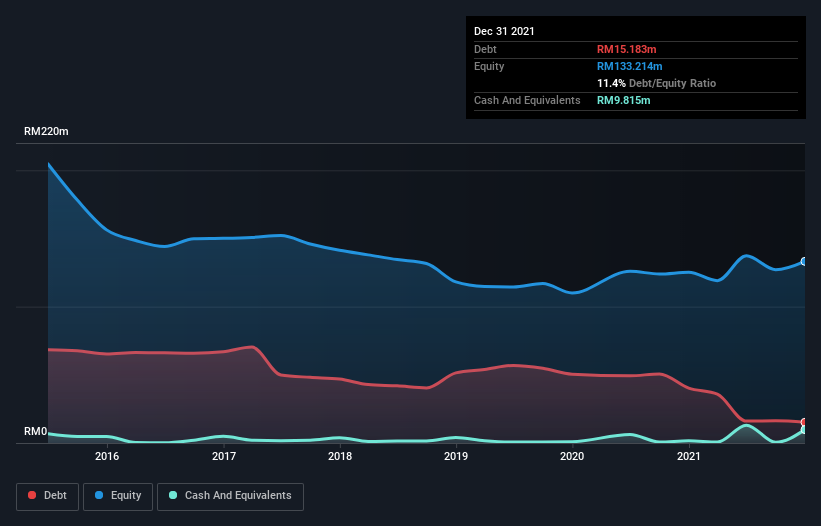Warren Buffett famously said, 'Volatility is far from synonymous with risk.' When we think about how risky a company is, we always like to look at its use of debt, since debt overload can lead to ruin. We note that Meridian Berhad (KLSE:MERIDIAN) does have debt on its balance sheet. But is this debt a concern to shareholders?
What Risk Does Debt Bring?
Debt and other liabilities become risky for a business when it cannot easily fulfill those obligations, either with free cash flow or by raising capital at an attractive price. Ultimately, if the company can't fulfill its legal obligations to repay debt, shareholders could walk away with nothing. While that is not too common, we often do see indebted companies permanently diluting shareholders because lenders force them to raise capital at a distressed price. Of course, plenty of companies use debt to fund growth, without any negative consequences. When we think about a company's use of debt, we first look at cash and debt together.
View our latest analysis for Meridian Berhad
What Is Meridian Berhad's Net Debt?
You can click the graphic below for the historical numbers, but it shows that Meridian Berhad had RM15.2m of debt in December 2021, down from RM40.2m, one year before. However, because it has a cash reserve of RM9.82m, its net debt is less, at about RM5.37m.

How Healthy Is Meridian Berhad's Balance Sheet?
The latest balance sheet data shows that Meridian Berhad had liabilities of RM58.9m due within a year, and liabilities of RM5.17m falling due after that. Offsetting this, it had RM9.82m in cash and RM1.86m in receivables that were due within 12 months. So its liabilities total RM52.3m more than the combination of its cash and short-term receivables.
When you consider that this deficiency exceeds the company's RM49.7m market capitalization, you might well be inclined to review the balance sheet intently. Hypothetically, extremely heavy dilution would be required if the company were forced to pay down its liabilities by raising capital at the current share price. When analysing debt levels, the balance sheet is the obvious place to start. But you can't view debt in total isolation; since Meridian Berhad will need earnings to service that debt. So when considering debt, it's definitely worth looking at the earnings trend. Click here for an interactive snapshot.
In the last year Meridian Berhad wasn't profitable at an EBIT level, but managed to grow its revenue by 154%, to RM39m. So there's no doubt that shareholders are cheering for growth
Caveat Emptor
Even though Meridian Berhad managed to grow its top line quite deftly, the cold hard truth is that it is losing money on the EBIT line. Its EBIT loss was a whopping RM7.8m. When we look at that alongside the significant liabilities, we're not particularly confident about the company. It would need to improve its operations quickly for us to be interested in it. Not least because it burned through RM23m in negative free cash flow over the last year. That means it's on the risky side of things. The balance sheet is clearly the area to focus on when you are analysing debt. But ultimately, every company can contain risks that exist outside of the balance sheet. Case in point: We've spotted 4 warning signs for Meridian Berhad you should be aware of, and 2 of them shouldn't be ignored.
Of course, if you're the type of investor who prefers buying stocks without the burden of debt, then don't hesitate to discover our exclusive list of net cash growth stocks, today.
New: Manage All Your Stock Portfolios in One Place
We've created the ultimate portfolio companion for stock investors, and it's free.
• Connect an unlimited number of Portfolios and see your total in one currency
• Be alerted to new Warning Signs or Risks via email or mobile
• Track the Fair Value of your stocks
Have feedback on this article? Concerned about the content? Get in touch with us directly. Alternatively, email editorial-team (at) simplywallst.com.
This article by Simply Wall St is general in nature. We provide commentary based on historical data and analyst forecasts only using an unbiased methodology and our articles are not intended to be financial advice. It does not constitute a recommendation to buy or sell any stock, and does not take account of your objectives, or your financial situation. We aim to bring you long-term focused analysis driven by fundamental data. Note that our analysis may not factor in the latest price-sensitive company announcements or qualitative material. Simply Wall St has no position in any stocks mentioned.
About KLSE:MERIDIAN
Meridian Berhad
An investment holding company, operates in the property development and investment businesses in Malaysia.
Excellent balance sheet with slight risk.
Market Insights
Community Narratives



